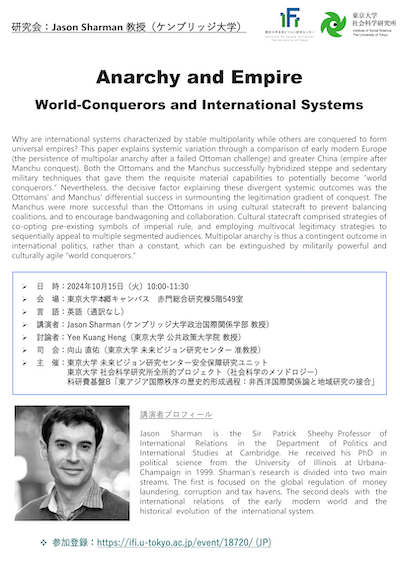Workshop 34:Anarchy and Empire: World-Conquerors and International Systems
Speaker:Jason Sharman [Department of Politics and International Studies, University of Cambridge]
Date:October 15, 2024/10:00‐11:30 (JST)
Location:Room 549 on the 5th floor of Akamon General Research Bldg.
http://www.u-tokyo.ac.jp/campusmap/cam01_08_02_j.html
Language:English
Target : Open to the public
Discussant: Yee Kuang Heng [GraSPP, University of Tokyo]
Moderator : Naosuke MUKOYAMA [IFI, University of Tokyo]
Abstract:Why are some international systems characterized by stable multipolarity while others are conquered to form universal empires? This paper explains systemic variation through a comparison of early modern Europe (the persistence of multipolar anarchy after a failed Ottoman challenge) and greater China (empire after Manchu conquest). Both the Ottomans and the Manchus successfully hybridized steppe and sedentary military techniques that gave them the requisite material capabilities to potentially become "world conquerors." Nevertheless, the decisive factor explaining these divergent systemic outcomes was the Ottomans' and Manchus' differential success in surmounting the legitimation gradient of conquest. The Manchus were more successful than the Ottomans in using cultural statecraft to prevent balancing coalitions, and to encourage bandwagoning and collaboration. Cultural statecraft comprised strategies of co-opting pre-existing symbols of imperial rule, and employing multivocal legitimacy strategies to sequentially appeal to multiple segmented audiences. Multipolar anarchy is thus a contingent outcome in international politics, rather than a constant, which can be extinguished by militarily powerful and culturally agile "world conquerors."
Co-hosted by Institute for Future Initiatives, The University of Tokyo

